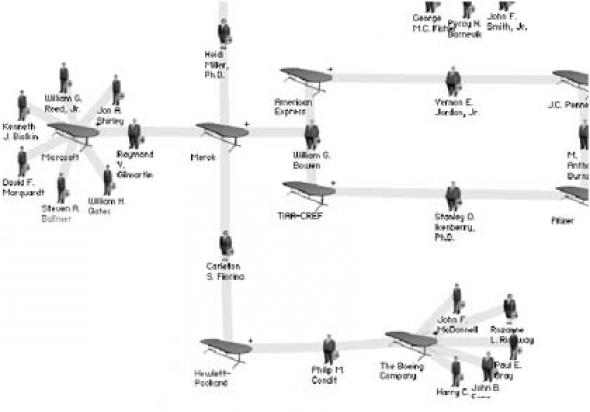Flash! ah ah... Saviour of the Universe
Two years after its launch, They Rule – a map of corporate America – is a web project with a large following. Its popularity even extends to the rarefied echelons of the art world, as demonstrated by its inclusion in this year’s Whitney Biennial. Here, Kate Rich interviews its creator Josh On, and presses him on how the project’s appeal as entertaining and informative spectacle might translate into the politics of mass participation he also espouses.
‘I don’t want to come across as reactionary. I just want to talk in a down to earth way about what we are facing in the world right now which is the unprecedented power of one country to impose its will on the rest of the world in the name of its corporations.’Josh OnThey Rule is an online power-elite group portrait of the sort not yet to be found in Life Magazine. It maps out the corporate constellations of the US Fortune 100 via their interlocking boards of directors. This novel star-map reveals that the majority of America’s most powerful companies are separated by less than three degrees of directorial intimacy.
An internet Flash-phenomenon, They Rule has also grown its own newsgroup [http://groups.yahoo.com/group/theyrule/] – a list to discuss issues raised by the theyrule.net website, such as:
From: perspicatious2Please help me to make better use of yourinnovative siteThanks, BillLike Bill, I too felt in need of help so I phoned Josh On at the office. I thought it might help to shed light on Josh’s contradictory use of disempowering Flash animation and his socialist politics of participation.
Kate Rich: Do you see They Rule primarily as a database or a map?
Josh On: It’s a map – no, it’s a tool. Well, it’s a database at the back end but primarily it’s a resource tool. People can make their own maps, or vote on the ones they like. For example the Pepsi one – everyone loves to know that the one director on Pepsi sits on a board of Bristol-Myers Squibb with a man from Coca Cola. What this isn’t is a tool for political action; it’s more of a cartoon. I’m really involved in socialist politics but I see that as something quite separate.
KR: People like the nice icons. What do they actually do with the data? Mute, for example, has a lot of graphic designers who subscribe and form a kind of devoted readership of the page margins. The editors have occasionally joked that no-one ever actually looks at the text. Do you think They Rule has a substantial style following?
JO: We read at least half of Mute, at futurefarmers. All that postmodern stuff I skip over though. Well, yes – but I’ve had a lot of different reactions. Some people go to They Rule just because someone’s written that it’s cool – and then they’re just shocked at the relationships these maps lay out. In fact I was shocked. There’s a lot of data in it, but hopefully there’s just one thing that comes across. And that is, that there is a ruling class and they’re interconnected as hell.
KR: It’s more a piece of ambient rhetoric.
JO: Right.
KR: So when you go deeper into the data, the effect just gets amplified.
JO: Exactly. You could do it in one sentence that said: ‘92 companies of the Fortune 100 in 2001 were connected through interlocking directories.’ That one sentence encapsulates it, but it doesn’t give you the detail. That’s why They Rule is visual. It gets visually imprinted in people’s heads so that when they think of the Fortune 100 now, they go – I know them, that’s all those john people.
KR: I like the john map. It concentrates the absurdity of mapping and compacting this kind of data.
JO: Well – it is iconic. It’s representative of something. What the john map says is that these are WASPs. And it points to something larger, that you should get outraged about. I see it more as propaganda than agitation.
KR: Can Flash empower the user? Here you are, at your computer, faced with all this intricate data, wielding your giant mouse over these tiny power mongers. The Gods’ eye perspective makes me kind of airsick. You can delete people or open their briefcases. Is this effective – or even metaphorically accurate? I was flitting through some Friedrich Kittler and he was saying, software is defined by its inventor or technician; the user is generally made helpless and dependent via user-friendly environmental detailing. I’ve always thought that Flash, for example, puts the user on the side of greatest dumbness.
JO: That’s a healthy skepticism of any preorganised thing. If you look at the motivation for most organisations in this society it’s to keep people down. A lot of software does that too. They Rule certainly isn’t a utopian piece of software.
KR: What are some of your more utopian thoughts?
JO: Well, one of the questions that doesn’t get asked on the Left enough is: what can we do to change the situation. I think it’s because there’s a sense of helplessness – yes. It’s a big problem and the solution has to involve our only strength, which is that there’s a lot more of us than there is of them – there’s six billion of us who aren’t within the ruling class. The main thing that unifies us is that we’re having our lives wrecked by the anarchic forces of profit.
KR: I see this as a conflict in They Rule: you’re at your computer and you’re viewing it alone. In fact you’re always on your own on the internet. It’s an interface problem – how do you collectivise?
JO: If you think of traditional forms of protest, there’s the demonstration – which is showing your solidarity and your unity. It’s a demonstration of numbers, people, and yourself as not an individual but as part of a movement. The internet, while it does connect millions of people together, really does so as individuals. One of the things that’s really hard to do on the internet is to show that you’re part of a majority. If you can solve that one you’ve solved a lot I think. With They Rule, I can enable people to contribute to it but that’s still as an individual, you’re right.
We did another piece called texan drawl [http://futurefarmers.com/texandrawl] in which you can draw whatever you want on the US President. And it’s great because there’s over 10,000 drawings people have done on the president and about 5000 of them involve penises. You get the sense that there are other people out there and they’re on the same side – but I think there’s nothing like the real world for that stuff.
 KR: Do you make connections between the new network technologies visible in the global configurations of They Rule, and potential techniques of resistance? As a socialist you must spend a lot time on phone trees, flyposting and painting slogans on banners.
KR: Do you make connections between the new network technologies visible in the global configurations of They Rule, and potential techniques of resistance? As a socialist you must spend a lot time on phone trees, flyposting and painting slogans on banners.
JO: I think it’s a mistake to see network technologies as central. On the one hand we should fight back using whatever understanding of the network we have – but, on the other, I really don’t see that their power lies in some new communications structure. If you look at the way they do business, it’s based on ye olde imperialism and an ever increasing violence against the workers, and that happens outside of any new technology.
There’s the fight around open source software which is one thing. But then it’s disgusting that people in America don’t have healthcare. I don’t mean that in a moralistic way, I think that free software is definitely one of the battles against the privatisation and commodification of everything; the expansion of capital into every sector of our lives. Championing open source is a valid fight – but also one we’re obviously not winning. Microsoft is still one of the biggest companies in the world.
KR: Is They Rule open source?
JO: No. I thought of doing that but it seemed like a lot of work. I have sent a bunch of people the source code – people have often wanted to use it for their own country’s ruling class so I have given out the code for that. All software should be free, but so should all bicycles, healthcare and houses.
There’s been a retreat I think on the left where 100 years ago we were saying private property is theft. And today we say, Intellectual Property is theft. It’s not just ideas that they’ve privatised – we should not only have open source software, we should have open source things too. It makes sense for a society to rationally decide what gets made, how it gets made and how it’s distributed. Although I don’t see that people who are advocates for open source necessarily talk about it in that kind of way.
KR: They’re probably more traditional in their expectations.
JO: They promote it as a libertarian enterprise.
KR: Where do you position the knowledge worker in your class landscape? Supposedly now 60-80% of workers in developed countries are knowledge workers or ‘change agents’, according to some new economy motivational manual I was reading.
JO: The first thing I’d say to that is, how many of those knowledge workers are working in phone banks? Call centres – one of the most brutal forms of wage slavery. Flexible work hours – nothing has changed in the basic dynamics. Today there are more working class people in South Korea than there were in the whole world at the time that Marx was writing. If anything, the possibility of a working class revolution, materially, is much more likely than it ever was before. Things are starting to happen in Europe again, you see general strikes, which in this ‘networked economy’ are really challenging the system.
KR: How does your activist lifestyle fit in with the your commercial work at futurefarmers?
JO: You mean politically? I can see there’s a contradiction, but it’s within society. What’s implied in the question is that a tactic for fighting capitalism is to abstain from it. To me that’s an impossibility. The set of strategies I’ve chosen to fight capitalism aren’t about abstaining, they’re about overthrowing it. So yes I do work for some big capitalist corporations – when I get the work – and I do a really good job. It’s not to say I like what they’re doing. In fact I spend a good third of my time fighting against them. How to do that? Organise the working class and myself as part of it.
While Dadaism was doing Dada stuff there was also Lenin building the first workers’ revolution of the world. That’s what I want to be part of, more than any art movement. That’s what I want – now that I get this chance to propagandise.
KR: What happens if a member of your database goes to gaol, do you have an icon for that?
JO: No. I have so many ideas for the next version. If someone wants to get in touch with me about sponsoring it I promise I’ll put their logo all over it. I have had people come to me and ask, what should I do? I could rant about what I think needs to be done. But that’s not what They Rule is. Hopefully it doesn’t leave people with a sense of helplessness as much as disgusted astonishment.
Kate Rich is a transient Mute reporter currently found in Bristol UK
Mute Books Orders
For Mute Books distribution contact Anagram Books
contact@anagrambooks.com
For online purchases visit anagrambooks.com








